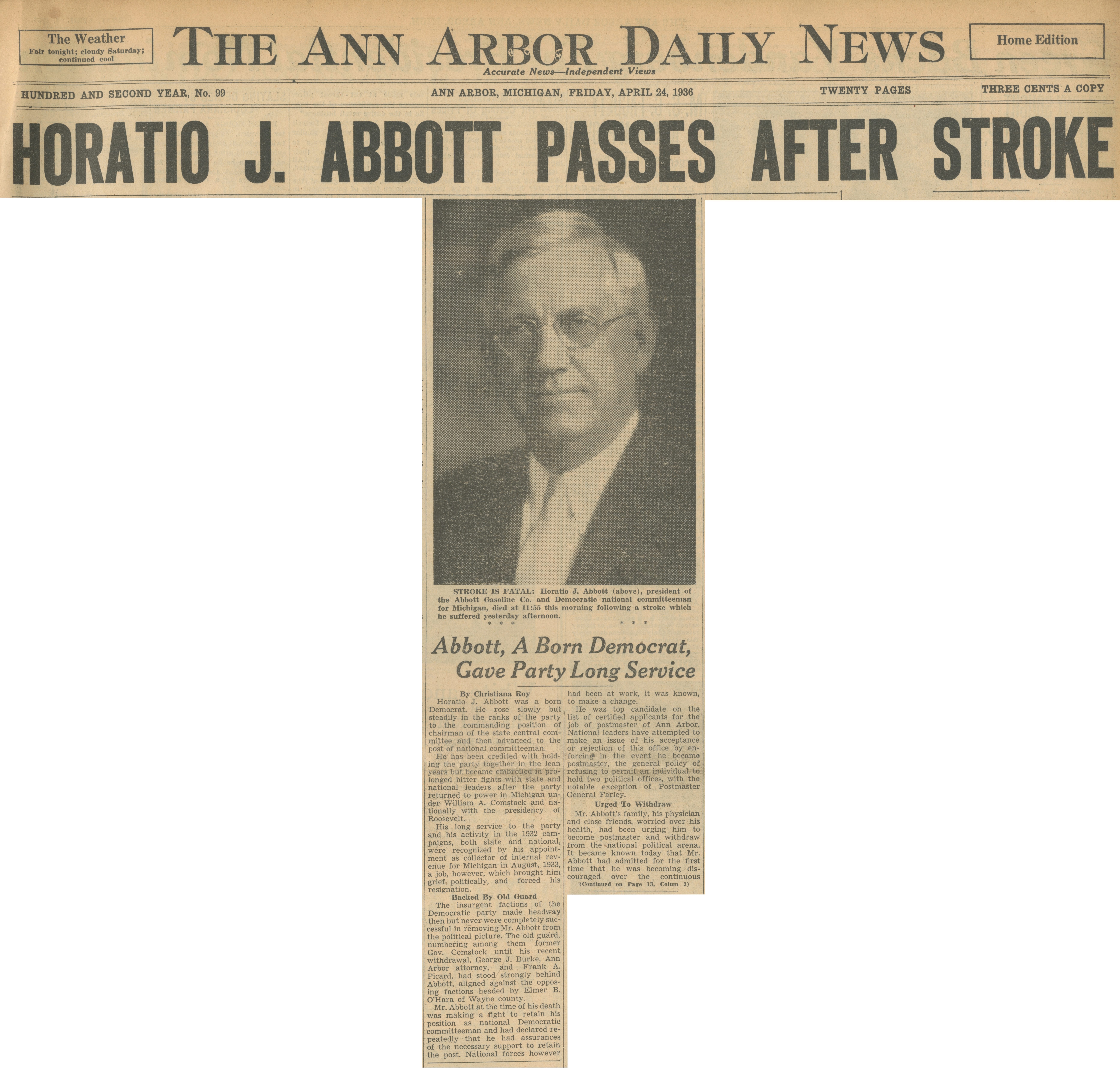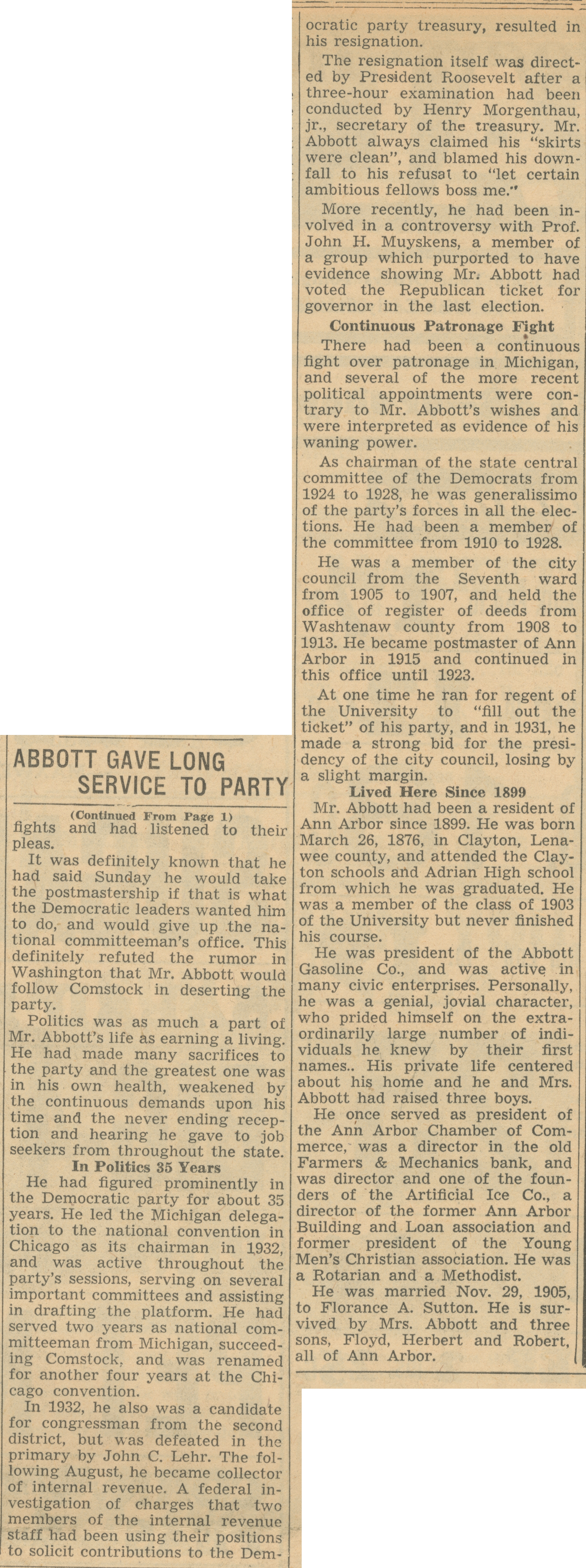Horatio J. Abbott Passes After Stroke


STROKE IS FATAL: Horatio J. Abbott (above), president of the Abbott Gasoline Co. and Democratic national committeeman for Michigan, died at 11:55 this morning following a stroke which he suffered yesterday afternoon.
Abbott, A Born Democrat, Gave Party Long Service
By Christiana Roy
Horatio J. Abbott was a born Democrat. He rose slowly but steadily in the ranks of the party to the commanding position of chairman of the state central committee and then advanced to the post of national committeeman.
He has been credited with holding the party together in the lean years but became embroiled in prolonged bitter fights with state and national leaders after the party returned to power in Michigan under William A. Comstock and nationally with the presidency of Roosevelt.
His long service to the party and his activity in the 1932 campaigns, both state and national, were recognized by his appointment as collector of internal revenue for Michigan in August, 1933, a job, however, which brought him grief politically, and forced his resignation.
Backed By Old Guard
The insurgent factions of the Democratic party made headway then but never were completely successful in removing Mr. Abbott from the political picture. The old guard, numbering among them former Gov. Comstock until his recent withdrawal, George J. Burke, Ann Arbor attorney, and Frank A. Picard, had stood strongly behind Abbott, aligned against the opposing factions headed by Elmer B. O'Hara of Wayne county.
Mr. Abbott at the time of his death was making a fight to retain his position as national Democratic committeeman and had declared repeatedly that he had assurances of the necessary support to retain the post. National forces however had been at work, it was known, to make a change.
He was top candidate on the list of certified applicants for the job of postmaster of Ann Arbor. National leaders have attempted to make an issue of his acceptance or rejection of this office by enforcing in the event he became postmaster, the general policy of refusing to permit an individual to hold two political offices, with the notable exception of Postmaster General Farley.
Urged To Withdraw
Mr. Abbott's family, his physician and close friends, worried over his health, had been urging him to become postmaster and withdraw from the national political arena. It became known today that Mr. Abbott had admitted for the first time that he was becoming discouraged over the continuous
(Continued on Page 13, Colum 3)
ABBOTT GAVE LONG SERVICE TO PARTY
(Continued From Page 1)
fights and had listened to their pleas.
It was definitely know that he had said Sunday he would take the postmastership if that is what the Democratic leaders wanted him to do, and would give up the national committeeman's office. This definitely refuted the rumor in Washington that Mr. Abbott would follow Comstock in deserting the party.
Politics was as much a part of Mr. Abbott's life as earning a living. He had made many sacrifices to the party and the greatest one was in his own health, weakened by the continuous demands upon his time and the never ending reception and hearing he gave to job seekers from throughout the state.
In Politics 35 Years
He had figured prominently in the Democratic party for about 35 years. He led the Michigan delegation to the national convention in Chicago as its chairman in 1932, and was active throughout the party's sessions, serving on several important committees and assisting in drafting the platform. He had served two years as national committeeman from Michigan, succeeding Comstock and was renamed for another four years at the Chicago convention.
In 1932, he also was a candidate for congressman from the second district but was defeated in the primary by John C. Lehr. The following August, he became collector of internal revenue. A federal investigation of charges that two members of the internal revenue staff had been using their positions to solicit contributions to the Democratic party treasury, resulted in his resignation.
The resignation itself was directed by President Roosevelt after a three-hour examination had been conducted by Henry Morgenthau, jr., secretary of the treasury. Mr. Abbott always claimed his "skirts were clean", and blamed his downfall to his refusal to "let certain ambitious fellows boss me."
More recently, he had been involved in a controversy with Prof. John H. Muyskens, a member of a group which purported to have evidence showing Mr. Abbott had voted the Republican ticket for governor in the last election.
Continuous Patronage Fight
There had been a continuous fight over patronage in Michigan, and several of the more recent political appointments were contrary to Mr. Abbott's wishes and were interpreted as evidence of his waning power.
As chairman of the state central committee of the Democrats from 1924 to 1928, he was generalissimo of the party's forces in all the elections. He had been a member of the committee from 1910 to 1928.
He was a member of the city council from the Seventh ward from 1905 to 1907, and held the office of register of deeds from Washtenaw county from 1908 to 1913. He became postmaster of Ann Arbor in 1915 and continued in this office until 1923.
At one time he ran for regent of the University to "fill out the ticket" of his party, and in 1931, he made a strong bid for the presidency of the city council, losing by a slight margin.
Lived Here Since 1899
Mr. Abbott had been a resident of Ann Arbor since 1899. He was born March 26, 1876, in Clayton, Lenawee county, and attended the Clayton schools and Adrian High school from which he was graduated. He was a member of the class of 1903 of the University but never finished his course.
He was president of the Abbott Gasoline Co., and was active in many civic enterprises. Personally, he was a genial, jovial character, who prided himself on the extraordinarily large numbers of individuals he knew by their first names. His private life centered about his home and he and Mrs. Abbott had raised three boys.
He once served as president of the Ann Arbor Chamber of Commerce, was a director in the old Farmer & Mechanics bank, and was director and one of the founders of the Artificial Ice Co., a director of the former Ann Arbor Building and Loan association and former president of the Young Men's Christian association. He was a Rotarian and a Methodist.
He was married Nov. 29, 1905, to Florance A. Sutton. He is survived by Mrs. Abbott and three sons, Floyd, Herbert and Robert, all of Ann Arbor.
Article
Subjects
Christiana Roy
Young Men's Christian Association
Register of Deeds for Washtenaw County
Postmasters
Farmers & Mechanics Bank
Democratic Party
Artificial Ice Co
Ann Arbor City Council
Ann Arbor Chamber of Commerce
Adrian High School
Abbott Gasoline Co.
Obituary
Has Photo
Ann Arbor News
Old News
William A. Comstock
Robert Abbott
John H. Muyskens
John C. Lehr
Horatio J. Abbott
Herbert Abbott
Henry Morgenthau Jr.
George J. Burke
Franklin D. Roosevelt
Frank A. Picard
Floyd Abbott
Florence Sutton Abbott
Elmer B. O'Hara